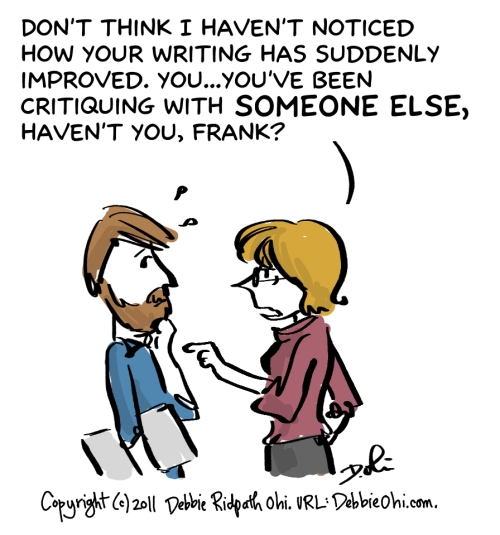 There are many threads on writing forums like Absolute Write and Scribophile where the topic of whether or not it is acceptable to critique the critiquer are discussed. There are many who are strongly against it. They might be afraid that the critique will shift focus from the author's work to other critiques, that things might get personal, or that critiquers will shy away from sharing their honest impressions and opinions. Then, there are some critiquers who do not want to receive feedback - they see it as a waste of time (or maybe they are afraid of having their pride hurt).
There are many threads on writing forums like Absolute Write and Scribophile where the topic of whether or not it is acceptable to critique the critiquer are discussed. There are many who are strongly against it. They might be afraid that the critique will shift focus from the author's work to other critiques, that things might get personal, or that critiquers will shy away from sharing their honest impressions and opinions. Then, there are some critiquers who do not want to receive feedback - they see it as a waste of time (or maybe they are afraid of having their pride hurt).There are so many things to think about when giving critique - What kind of critique does the writer want? How do I critique a first draft versus a final draft? Should I be providing feedback on big-picture issues or line-edits? Luckily, there are resources out there for those who want to improve.
So far, the best breakdown of how to give an appropriate critique that I've found is on Janice Hardy's blog.
Otherwise, here are some additional resources I've found helpful:
How to critique a manuscript and stay friends
Checklist for critiquing a novel
The Critter's Library
So what about you? Have you ever received feedback on a critique you've given? Would you want to? And if you agree that it's important to work on critiquing skills, what do you do to improve?

Thanks for sharing these links. Very useful. I've bookmarked them all in my writing folder. Critiquing is one area I really want to improve on.
ReplyDeleteI'm so glad you found them helpful :)
DeleteGreat post! Critiquing is such an important part of the writing process, especially in longer works, but sometimes it can be hard to tell if you're giving useful advice or if you're "that guy" that you know everyone else is rolling their eyes at. The subjective parts of writing are particularly tough to critique.
ReplyDeleteGreat list of links, I'll be checking them out!
oh yeah, I hope I've never been "that guy" with the lame feedback, haha
DeleteGreat links!
ReplyDeleteI learned how to critique by reading other critiques, but I could always use more help in that area!
I've definitely learned a lot too by reading other critiques - I especially love it when agents and authors post critiques on their blogs. I've learned a lot that way from Janice Hardy and Suzie Townsend in particular.
DeleteThank you for your comment! This was a very interesting post. As part of a course I'm taking at the moment, we're required to offer critiques on each other's work, something that is much more difficult than I thought it would be. I'm sure those links you provided will be very helpful :)
ReplyDeleteNikki – inspire nordic
Sounds like perfect timing :) Good luck with the critiques!
DeleteI usually will send the first couple of pages back to the writer right away so he/she can see what I do and request adjustments as they see fit.
ReplyDeleteThe last woman I crit'd for gave me a list of things she was specifically interested in, critique wise. It was very helpful.
That's a good idea - I always do a first chapter test run with CPs before we swap MSs, but I always used it more to see if the other person's MS was something I'd be able to finish and provide helpful feedback on or not. But, you're right - it's also a great opportunity to let the critiquer know whats working (or not) and request changes.
DeleteGreat post! Thanks for all of the links. :)
ReplyDeleteI often ask the author what they're looking for, such as pacing advice, awkward phrases, confusing spots, grammar, style, character development, dialogue, etc. That's a good jumping off point for me, then I tailor it to what I find while reading through.
ReplyDeleteIt's definitely a good idea to ask and I've used some of the information in the links I provided to help me answer my CPs so they work both ways :)
DeleteYou know, I've never really seen this end of it discussed. You make excellent points. I'd like to join a critique group at some point, and I'd definitely want to be able to get a good critique, as well as receive one. Thanks!
ReplyDeleteI'm your co-host for the A-to-Z! If you didn't get an email from me the other day, it may have gone in your spam box. Please feel free to contact me via my profile or reply to that email if you need anything or have any questions.
Shannon at The Warrior Muse, co-host of the 2012 #atozchallenge! Twitter: @AprilA2Z
Thank you :)
DeleteI always ask, do a trial run, and see if the person wants to dump me right there. It's happened once, but it takes a while to build trust, and I've found that with my current CP. I'm so lucky! Thanks for the links!
ReplyDeleteMy C
Getting rejected by a potential CP can't be any fun, but it would be much worse to go through the whole process only to find out later that your CP wasn't really comfortable providing honest feedback on your MS.
Delete